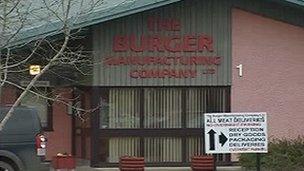Horsemeat scandal: Council chief's rigorous test pledge
- Published
Seven councils were supplied with food from the Burger Manufacturing Company where three samples have proved positive
More rigorous testing of food being used by Wales councils is being promised after horsemeat was found in burgers produced by a Powys supplier.
Seven councils were supplied with food from the Burger Manufacturing Company (BMC) near Builth Wells, where three samples have proved positive.
Welsh Local Government Association chief executive Steve Thomas said testing would now be "ratcheted up".
Supplies to schools must be safe, he said.
Monmouthshire, Blaenau Gwent, Merthyr, Rhondda Cynon Taf, Caerphilly, Powys and Neath Port Talbot councils are affected in the latest development in the horsemeat scandal.
They all receive burgers which are made at the Burger Manufacturing Company (BMC), and which are supplied through a food distribution company in Powys called Holdsworth.
Holdsworth said they when they became aware of the potential problem with the burgers, they withdrew them and collected them back in.
BMC, based in Llanelwedd, said its meat came from Farmbox Meats in Llandre, near Aberystwyth, which is already under police investigation.
BMC has withdrawn suspect products after three samples tested positive for horsemeat.
Five of the councils affected have said that while there is no evidence that they received contaminated burgers, they have withdrawn them.
They said they are working with their supplier over further testing and to ensure that no contaminated products reach school children or any of the other people they supply food to.
But the impact on the food supply to councils is spreading further than the seven authorities.

BMC has withdrawn suspect products after three samples tested positive for horsemeat
The BBC has discovered that Newport and Wrexham councils have also withdrawn burgers they receive from different suppliers - both saying it was a precautionary measure. Flintshire has also withdrawn burgers.
Mr Thomas said the present crisis was not one of food safety but one of trust. He told BBC Radio Wales the testing regime would have to be "ratcheted up" and councils will have to be "more vigilant in the approach that they take".
Mr Thomas said councils must endure that the food they are using is safe.
"Obviously we can't cut all meat. We need to ensure, however, that the supplies that are going into schools are safe. If we discover that they're not they will be withdrawn immediately."
No absolute guarantee
He said they were waiting to see the outcomes of the very large national tests in 28 UK authorities being carried out by the Food Standards Agency.
"I think from our point of view, from our trading standards and environmental health divisions, we will vigorously prosecute those who undertake fraud within the food chain."
BMC is the latest Welsh company forced to act over the scandal.
On Wednesday, Carmarthenshire firm Castell Howell Foods said it had contacted the five customers who received deliveries of a range of frozen cottage pies. The Cross Hands company said it followed discussions with frozen ready meals supplier Oak Farm over the possibility of horsemeat contamination.
Oak Farm has launched an investigation, but also stressed that all tests for equine DNA on products to date have tested negative.
Mr Thomas also said the parameters of the scandal were widening and there could be no "absolute guarantee on anything". He said supplies going into local councils were being tested thoroughly, adding: "We are doing that in terms of our traditional role vis-a-vis environmental health trading standards to the public.
"Many councils run residential care homes I'm sure they're testing now in terms of the supplies that go in and many of the suppliers are the same as supply produce into schools."
David Jones, leader of Powys council, said they had been supplied by Holdsworth for "some while" without any concerns about quality.
He told BBC Radio Wales he did not believe the authority had been complacent and as soon as there was a concern the product was withdrawn from schools straight away.
"When you buy from a company that has got full traceability, that passes every test, that's approved by a consortium of Welsh local authorities - this wasn't just one Welsh authorities, it was seven of us in a consortium all purchasing jointly,
"I think there were probably enough checks being done. But possibly we were checking more for the safety of the food, from the point of view that it wouldn't upset your tummy or something like that."
Mr Thomas also advised parents to stick with the "splendid" school meals service.
He said his organisation was looking as much as it could to locally source foods, saying the issue was with a "very small minority within the system".
- Published21 February 2013
- Published19 February 2013